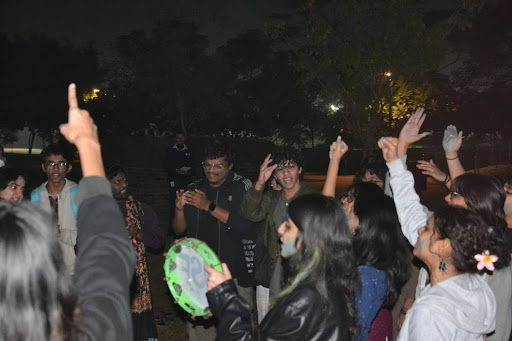Shaping a Movement: USF's Rise and Revolution at Ashoka
- Katelyn Patta
- Jan 22
- 5 min read

On October 28th, 2024, Ashoka University witnessed an unprecedented act of solidarity as the United Students Front (USF), in collaboration with the Democracy Collective and the TransUnion, organised a fundraiser for Palestinian aid. The event raised over Rs. 85,000, making it the largest student-led fundraiser in Ashoka’s history.
The event featured a mix of posters, earrings, books, and other artwork, all contributed by student volunteers. Direct donations were also accepted, amplifying the effort's success. “We were quite surprised with how well it turned out to be,” referring to the turn out, said Razeen Ayesh (UG’26), Secretary of the USF. She attributed part of the success to pricing “according to Ashoka standards,” which encouraged wide participation.
The USF’s initiatives have clearly resonated with students. As a relatively new organisation, their ability to engage the campus community and spark conversations around pressing social and political issues has positioned it as a prominent force in reshaping Ashoka’s political landscape.
The Rise of the USF
The United Students Front (USF) is a left-aligned, independent student forum founded in March 2024 during the Ashoka University Student Government (AUSG) elections. On 11th November, The Edict interviewed Insha Husain (UG‘26), Sneha Menon (UG ‘26) and Razeen Ayesh (UG‘26) of the USF to understand its structure and goals. Husain, President of the USF, said that the organisation emerged from students who met during the Student Justice Forum’s (SJF) protests demanding a caste census earlier this year.

According to Menon, co-head of the USF’s writing department, the core members were “ideologically contributing” to the protests but felt compelled to start their own collective. The core members sought to address the “loopholes” and “lack of accountability” they had observed in SJF by coming up with a firm organisational structure. The USF formalised its structure with a President, Secretary, and three departments—Writing, Logistics and Communication, and Design—each led by a head.
A month after their founding, in April, the organisation released its manifesto broadly outlining their goals such as holding the administration accountable, ensuring workers’ welfare, addressing gender justice and sexual violence on campus, and promoting academic accessibility.
Vision for a Student Union
The USF’s long-term goal is to replace the current AUSG structure with a Student Union that exclusively prioritises student demands. “The current system serves the administration and operates as a bureaucratic body,” Husain explained. She envisions a union modeled on the Delhi University Students Union (DUSU), which serves as a representative body for students and faculty. Husain highlights that the transformation—“from being a bureaucratic administrative body to a union that solely is for students and by students”—must come as a demand from the students themselves. Echoing this sentiment, Menon remarked, “It doesn’t mean anything if the students don’t have faith in it. If you change the name of Student Government to Student Union, it doesn’t mean anything because the whole point of a union is that it’s composed of the entire student body.”
Despite its critique of the AUSG, the USF has chosen to participate in its elections to push for change from within. Husain and other USF core members—Ayesh and Parvathy Pradeep (UG’26) —were elected to the Council this year. Ayesh is secretary of the Employee Welfare Committee, Pradeep is the head of the Diversity and Inclusion Committee and Husain is a member of both.
Ayesh, as the secretary of the Employee Welfare Committee, mentions that before the committee begins “formalising the work,” it needs to get a better understanding of what employees issues entail. She highlights that the committee has been prioritising communicating with the employees and getting information while emphasising the challenges of initiating dialogue with them. Menon adds that it is because, “they're (the employees) heavily surveilled by the administration and discouraged from talking to students.”
Besides this, within the AUSG, the members of USF possess notably low attendance records. Since 5th July 2024, Husain maintained a 60% attendance rate, whether excused or not, while Ayesh’s attendance stands at 46.87% without excused absences and 53.85% with them. Pradeep, however, records a particularly low attendance rate of 20%, both with and without excused absences. This was a flashpoint in the heated by-election that was eventually won by Dhruvajyoti Sahu (UG’27), enlarging USF presence in the House of Representatives. Members of the Leher collective pointed to House attendance records as a measure of how seriously the different collectives take their work. While not directly refuting the claim, a statement from the USF suggested that work outside the AUSG’s “bureaucratic framework” should not be discounted.
Nevertheless, this dual approach reflects a larger vision. “Ashoka assumes a position that is detached from the country,” Husain said, emphasising the need to align campus politics within the framework of broader national politics, especially for marginalised groups on campus.
Expanding Political Discourse
While the USF essentially wanted to become that platform for people, Husain emphasised the balance they strive to maintain. “It’s not just about doing charity but also about being mindful of your own politics and where you stand,” she said. The USF’s efforts are not limited to fundraisers and electoral politics. They host memorials, film screenings, reading circles, and open meetings to encourage ideological engagement. “To ideologically inform people why and what is going on in Palestine is central to our cause,” she said, for instance. Yet, as Husain observed, such initiatives often receive less traction compared to fundraisers.

The USF also supports independent student-led initiatives like Qaasid, a political and cultural magazine founded by Dhruvajyoti Sahu (UG '27), a newly appointed House of Representatives (HoR) member and co-head of the writing department of the USF. Sahu felt motivated to start this venture as he felt that there was a lack of political discourse and dissent at the university. “The left exists in that there are people that would identify themselves as the left, but we're not organised,” he added.
Looking Ahead
The USF also draws inspiration from the All India Students Association (AISA), a left-wing student group affiliated with the Communist Party of India (Marxist-Leninist) Liberation, which many USF members are a part of.
Husain, also a member of AISA, says that the USF draws from AISA’s long history of organising and being politically active. It helps the USF, she says, “in terms of developing a precedent” at Ashoka. Having members of the USF individually involved with other political organisations also allows for them to have a perspective of student politics in other universities while situating Ashoka within the context of broader national politics.
However, building a mass movement is not without challenges. “We cannot demand a Student Union without mass mobilisation,” Husain said, emphasising that the success of such a demand depends on widespread student support. She acknowledges that there is a “lack of direction” within the current political climate, which often constraints the formation of collective efforts.
This challenge is further compounded by “a general sense of apathy among the student body,” according to Ayesh. She noted that indifference is a significant barrier to mobilisation, making it difficult to sustain enthusiasm for long-term objectives. Menon reflected similar concerns, pointing out a pattern of temporary outrage. “Every semester or so, there will be one issue that comes to light, and then the students will be outraged, but it sort of dies down,” she said.

While still in its early stages, the USF has established itself as a dynamic force on campus. Ayesh specifies that the USF’s aim is to bring about a larger change in the political culture of Ashoka and that if not the USF, they hope that at least its impact will be built upon in the future.
For the USF, the journey ahead is about more than events or elections. It is about transforming Ashoka’s political culture, creating spaces for marginalised voices, and inspiring collective action for systemic change.
[Edited by Madhumitha GI, Fatema Tambawalla, Vishnu Prakash]







Comments